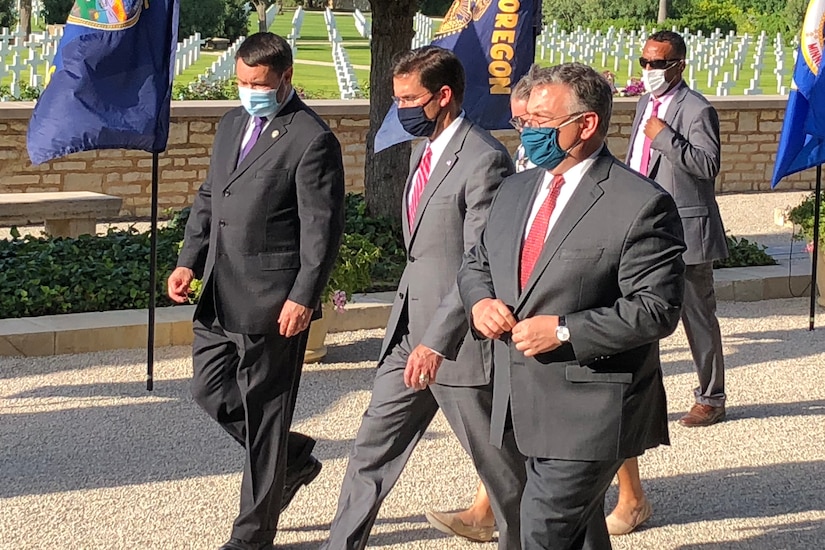Sept. 30, 2020 | , DOD News
America will maintain partnerships with like-minded nations in Africa, Defense Secretary Dr. Mark T. Esper said today at the North Africa American Cemetery in Carthage, Tunisia.
U.S. service members will stand by their allies to make the sacrifices of previous generations matter.

The cemetery is the final resting place of more than 2,800 American men and women who fought in North Africa during World War II. The names of more than 3,700 Americans missing in action are carved into a wall facing the graves.
"These soldiers, sailors, airmen, Marines, Coast Guardsmen, and merchant mariners fought alongside our partners and friends, living up to their sworn oath to defend the Constitution and the United States, against the forces of evil, in the North African campaign," Esper said in the remarks after he placed a wreath at the site. "Not only did they make the ultimate sacrifice for our freedoms today, but their experiences in combat also taught us vital lessons that hold true nearly eight decades later — lessons that we must keep close in the years ahead."
The U.S. troops were part of Operation Torch, launched in November 1942 in Morocco and Algeria. The combat against German and Italian troops went back and forth and it wasn't until May 1943 that the Axis forces were defeated here in Tunisia. "(The victory) secured North Africa and the Mediterranean's strategic supply routes, and positioned the allies to liberate Europe," the secretary said. "Importantly, our victory demonstrated the power of like-minded nations standing arm-in-arm in the campaign against tyranny, and taught us that the way to win is to fight together."
The horrendous losses of World War II and the allies collective success led to the creation of a post-war international order that has secured peace, stability and prosperity around the world for the past 75 years, the secretary said.
But that global order — based on shared values of liberty, the rule of law, human rights and national sovereignty is under pressure in this new era of great power competition, Esper warned.
"Today, our strategic competitors China and Russia continue to intimidate and coerce their neighbors while expanding their authoritarian influence worldwide, including on this continent," he said. "At the same time, violent extremists continue to pose a threat not only to regional stability, but also to our homeland. The United States' enduring partnership with like-minded countries — including here in North Africa — is key to addressing these challenges."
China is attempting to divide natural allies and put in place a new set of rules that answer to Beijing. Russia is trying to assert its power by acting as a spoiler in Europe but also in neighboring Libya and in Syria.
The effort to counter this requires a whole-of-government approach, but the Defense Department has a role to play. DOD is working to strengthen partners' defense capabilities and blunt transnational threats, Esper said. "We help degrade violent extremist organizations, and deliver humanitarian aid and disaster relief to local communities," he said. "And, together we continue to counter the malign, coercive and predatory behavior of Beijing and Moscow, meant to undermine African institutions, erode national sovereignty, create instability and exploit resources throughout the region."
The United States is doing this work "in good faith and with a sincere aspiration for a more secure, stable and prosperous Africa," the secretary said. This work includes political and economic development marked by free, fair, and reciprocal trade and investment — and respect for the sovereignty of all nations.
"As the global partner of choice, the United States will continue to deepen our alliances and partnerships across the continent, including with Tunisia, where your democratic government and sovereignty have made much of our work in the region possible," he said. "We look forward to expanding this relationship to help Tunisia protect its maritime ports and land borders, deter terrorism, and keep the corrosive efforts of autocratic regimes out of your country — as we build closer ties in the spirit and service of those who first set us on this path."








No comments:
Post a Comment